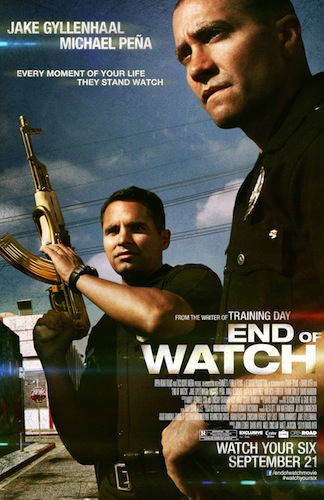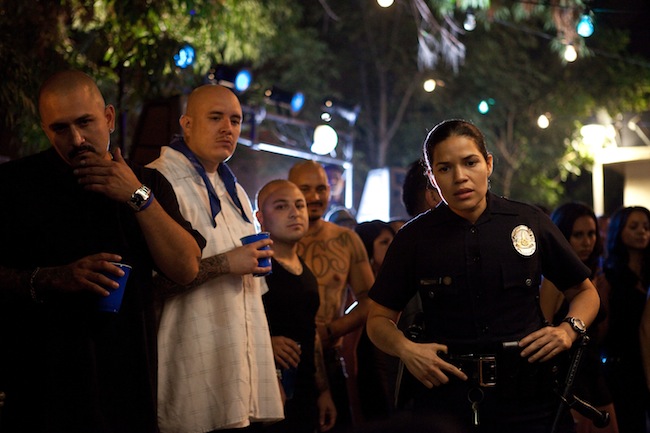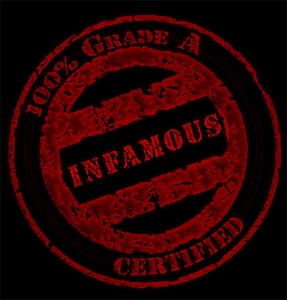
With END OF WATCH, America Ferrera is shifting to a new phase of her career, beyond the one that was defined by her titular role in ABC's UGLY BETTY. As Officer Orozco, Ferrera portrays a role that we don't often see get attention from Hollywood - a policewoman. As a tandem with Cody Horn, Ferrera is given the opportunity to put a female face on law enforcement that stretches beyond your typical clever detective. She's out on the frontlines as a beat cop, showing that women can hold their own as police officers just as well as anyone else.
While America was up at the Toronto International Film Festival, I had a chance to talk with her about END OF WATCH, in order to gain her perspective on what women of the law go through on a regular basis. Enjoy...

America Ferrera - Hello.
The Infamous Billy The Kidd - Hi, how are you?
America Ferrera - Hi there. Good, thank you.
The Kidd - How’s Toronto treating you?
America Ferrera - It’s good. It’s a little rainy today, but it’s good.
The Kidd - Okay. So let me jump right in and ask you specifically about your inclusion in END OF WATCH, which gives a voice to a segment of law enforcement that we don’t really get to hear a lot about, and that’s policewomen. How difficult is it to be a female of the law, in terms of what your research and the script helped you learn about that type of position?
America Ferrera - Yeah. Well, I got to spend some time with some pretty amazing female police officers and one of the things that I just heard echoed over and over again was that kind of saying that this perception of a woman trying to prove her machoness or trying to, you know, quote, unquote, man up, is just kind of not what’s prevalent. What’s prevalent is women who bring a different side of police enforcement to the work. There are obviously things that certain women are limited in physically, you know, if you’re a certain height, or if you’re a certain weight... just the truth is that you’re going to come up against physical limitations that... maybe... That they saw the value in a female officer that she brought tactically and intellectually, and... We had a lot of men, police officers, say that their best partners were female cops because they could intellectually manage a situation and de-escalate something and solve the situation without having to resort to any kind of physical force. So it was a really fun getting to learn that the women weren’t trying to be men, they were being women and doing what women do well, and differently and uniquely. And that’s not to say that they weren’t prepared to be involved physically if they had to be, which was a daunting thing for me. David [Ayer] really wanted us to try and put ourselves as much in the shoes as we could and try and experience... What’s the change in your breath when you’re confronted with a physical situation and on the first day we all went to a police academy and all had to wrestle a 200-pound man. [Laughs] It was incredibly humbling, as a 5-foot-1 woman, knowing that no amount of exercise I’d ever do would make me strong enough to fight a 200-pound man who is sitting on me. But, you know, over time, he had us do mixed martial arts. I, particularly, was boxing, because I felt like my character was definitely a boxer... Over time there was a certain amount of confidence and preparation and know how that... I’m not going to pretend like I was ready to go onto the streets, but I can realize... How I can see how when you’re equipped with the physical preparation, but also the smarts, of how you avoid physical confrontation. But then if you’re in a physical confrontation, how do you use your brain to get you out of it, and not just brute force. You realize that the women on the job were pulling from all of their best resources, and were great cops in a different way than men were great cops.
The Kidd - Is there an inherent trouble in gaining respect from the other side of the law? Because you have people who may already not like cops as it is, and then there’s an extra layer added to it, with a woman being a police officer at that point, too, where they’re not being seen as one and the same, they’re seeing it as being exclusive to one another. So is there kind of a trouble that you saw? I know you guys did ride-alongs, but in terms of how police women are perceived by those that they have to deal with on a regular basis.
America Ferrera - I imagine that there’s definitely a perception of when somebody sees a male cop drive up versus a female cop, but all of the women that we saw on the job carried themselves in incredibly strong and assured ways. What we heard over and over again is like, a big part of being a cop is the way you carry yourself, and all of the messages you’re sending about how assured you are about how well you can do your job. And it was true for the women; If the women were carrying themselves in a certain way, there was no way that you would look at them sideways, because they were tough. They were real tough.
The Kidd - There’s also a sense of brotherhood, and family that END OF WATCH really gets into. Kind of like a fraternity when you join the force and you’re a police officer. Do you think that there are any issues with women gaining acceptance into this fraternity? Or once you kind of get that badge, you’re welcomed into what it is that everyone is doing?
America Ferrera - No, I don’t think that it’s as... lovely as that. You know, we spoke to a lot of women who, yeah, had had to prove their worth as a cop to be accepted. I think it’s true for all the cops, that you don’t just gain the respect, you earn the respect of your co-workers. But I think the women particularly? Sure, there are prejudices and preconceptions that they’re not going to be good at certain things, and I think... Each individual has to kind of find a way to overcome that. And, you know, I don’t think that it’s as easy as a blanket statement, I think it’s probably differnet in every single situation. But we met women who were very open about the prejudices they had to overcome, and some who had to overcome them and some who hadn’t. It’s definitely in there, in the way that I think it’s in every single field of work between men and women.
The Kidd - You’re from L.A., born and raised. Were you prepared for this new side of the city being exposed to you, in terms of going out on these ride-alongs and seeing what police deal with on a regular basis?
America Ferrera - No, I wasn’t, actually. I was very emotionally unstable, for most of those. The very first thing that we did as a team was... We were at the police academy and they brought us into a room and they made us close our eyes and they played real, live 9-1-1 calls. And some of them were children making 9-1-1 calls because one of their parents was physically attacking another. It was really hard, and it was really, really tough. Not to say that those things only happen in those areas, but to know the frequency with which these cops were dealing with these situations, the reality of what a child in a certain neighborhood knows and sees before a child in a different neighborhood... It took an incredible emotional toll. And a lot of what we spoke to... a lot of what I spoke to the cops about, male and female, were, what was the emotional toll? They were fairly open about it, and said that it’s tough. That it’s really hard. It’s not easy, and even when you think you’re getting used to it, you’ll see something that reminds you that you’re human, and you’re going to continue to be affected, even though it’s your job to deal with those types of situations.
The Kidd - You’re very active politically, so I wanted to ask you your thoughts on treatment of cops in general. We hear a lot of times about their pay getting cut or reduction in force. So I just wanted to get your take on why we don’t take better care of these people who on a daily basis put their lives on the line to protect us, and don’t ask a lot in return.
America Ferrera - My older sister was actually a cop for a while in California and... It wasn’t until a spent a little bit of time as a fly on the wall on certain ride-alongs, in the type of training they undergo, to really get a glimpse of what their job entails. It’s an embarrassment that we couldn’t take care of the people who put their lives on the line for public safety. I think it’s awful, and I think that... They give so much of themselves and they’re putting their lives on the line on a daily basis. So I would say that it’s shameful that we wouldn’t reward them for the work that they do.
The Kidd - You’re also very involved with Get Out The Vote campaigns, particularly for Latinos. So I just wanted to get your opinion on some of the proposed voter ID laws in numerous states, and why you think there is an effort to make it more difficult for people to vote, instead of more accessible.
America Ferrera - Well it’s the same efforts that have been attempted throughout our history. That have been racially driven or targeted certain demographics that certain people don’t want voting. What’s interesting about the voter ID laws is they affect several different groups. They disproportionately affect young people. All young people. Students... The African-American community, and enormously they affect the Latino community. They affect the elderly, they affect the disabled, they affect an enormous amount of different groups and all supposedly to solve a problem that doesn’t really exist, this idea of voter fraud that people have found very very difficult to actually prove that there is a level of voter fraud that requires this sort of widespread fighting back against, which just really makes it very difficult for certain groups of people to take part in the political process and exercise their right to vote.
The Kidd - Let me ask you about CHRISTINE, which is the web series that you’re involved with. What are your thoughts on the web as a method of content distribution as we’re seeing people move in that direction to have edgy or fresh material that you wouldn’t normally see as a network series, that the web is the home to take some risks in terms of doing new things?
America Ferrera - It’s really exciting. I was really drawn to the project CHRISTINE based on content. I’m a huge fan of Rodrigo [Garcia], who wrote the script and sent it to me, and I... I’m a fan of his and I love the character and I love the script. I think the bottom line is that the content has to be appealing. But then it was also really exciting to engage in this new platform. To try and experiment and have fun with the ways that technology is challenging us to communicate, and the way that people are more open to different types of content because of new technologies. I thought it was really exciting when it was rolling out on... To be able to see the way the audience interacted so directly with each seven to eight minute episode that went up on the air.
The Kidd - Finally, a lot of people, myself included, I think, were really surprised with how fantastic HOW TO TRAIN YOUR DRAGON turned out, for all audiences. I know work is already underway on the sequel, so what can you tell me about HOW TO TRAIN YOUR DRAGON 2, and how closely things are set to follow the book series that it’s based on?
America Ferrera - The plans for HOW TO TRAIN YOUR DRAGON 2 are huge plans, and the series only gets deeper and more interesting. I agree with you, I was really, really surprised at the level of storytelling that they achieved in the first film of HOW TO TRAIN YOUR DRAGON. As an actor, you’re such a small part of that process. You come in and record lines once every few months, and you don’t get to see all the visuals and the images and the animation coming together. You don’t even get to hear what the other actors are doing, so you see it all come together, and see what... what was accomplished in this platform in animation. It was so exciting for me, and knowing what happens in the second movie, knowing where they’re taking the series... It only gets more exciting and I think it will be just, if not more impressive than the first one.
The Kidd - Well, good luck with the film, and keep up the good work on the Get Out The Vote campaign. I think it’s really important to have people not disenfranchised and thinking that their votes matter and count, and especially in this year, an election year, it’s very important. So good luck with all of that, and thank you very much for taking the time today.
America Ferrera - Great, thank you so much.
The Kidd - Thank you.
America Ferrera - Okay, bye.
The Kidd - Bye.
END OF WATCH opens this Friday, September 21.
-Billy Donnelly
"The Infamous Billy The Kidd"
Follow me on Twitter.

